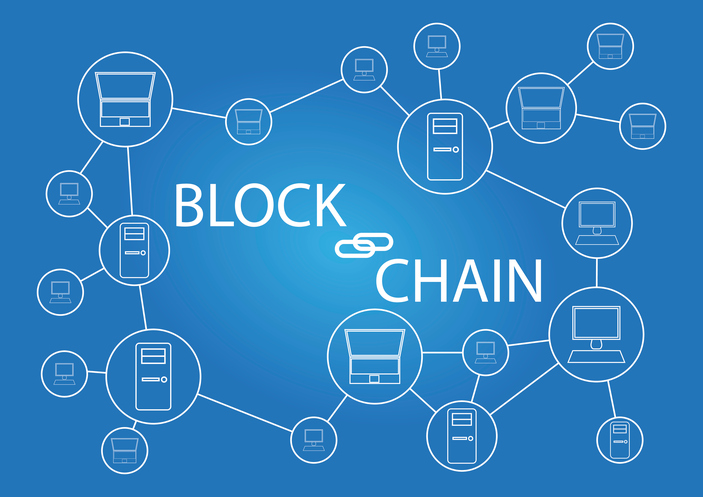The present organizations are going to big business blockchain for straightforwardness and security. Associations are looking for a straightforward blockchain definition to help them understand this developing, “distributed ledger” innovation. This is what intelligent organizations should think about why it is essential and how it works.

Blockchain Explained- What Is It?
Blockchain is regularly alluded to as an ongoing, changeless record of exchanges and possession. However, what does this mean? Essentially, it is a reliable, formidable to-hack record of sales—and of who claims what.
Think about an information base with data put away in blocks. These squares can be duplicated and imitated on singular PCs. These are indistinguishable and adjusted with each other. At the point when somebody includes or deducts information, it changes the data across them all.
Everyone is similarly as secure as your internet banking gateway—about unhackable. Blockchain records can consolidate a wide area of reports, including advances, land titles, coordination’s shows, and nearly anything of significant worth. Extensive data can partake in a multi-confirmation condition that is ideal for ongoing, secure data sharing.
Since the innovation is propelling, use cases are advancing. As the quantity of business verticals utilizing Blockchain grows, adherence to information security laws gets principal.
Blockchain-as-a-service (BaaS) folds the Blockchain circulated record stage into the cloud-based programming conveyance and permitting model effectively well-known with undertakings hoping to reduce expenses while expanding security proficiency. BaaS supplies the responsibility, straightforwardness, “Security” of the Blockchain effectively noted without utilizing in-house assets, as specialists keep up the “BaaS network” in the cloud.
Energy for blockchain innovation is working with Gartner assessing Blockchain creating “3.1 trillion” in business esteem by 2030.
Why Is Blockchain Important?
Blockchain is very much essential to security. Here’s the reason. New squares (with new data) are added continuously to the furthest limit of the chain. Every expansion has its computerized mark or hash that is a progression of numbers and letters. Think about a mystery math code of sorts. Change a sum or number in the square once it’s been included, and these marks change as well.
Programmers would need to effectively switch all the data all over the Blockchain to be fruitful.
This innovation also removes the broker to assist organizations with setting aside cash and making a more significant amount. Blockchain permits undertakings to approve and do safe exchanges all the more legitimately. Hypothetically, bargains complete without legal counselors, investors, dealers, and other agents. What’s more, they meet in a more intuitive route since anybody in the chain can make information changes, and afterward saw and approved by different members.
How Does Blockchain Work?
How blockchain functions are clarified best by understanding the shared angle. It depends on what’s called dispersed record innovation. Everybody in the distributed organization making up these records can look at similar data in singular squares.
An exchange recorded on one PC or hub is evident to every one of the PCs in the progressive organization. Everybody can see similar information. Furthermore, they can dismiss or confirm what they see. The data is then conveyed to each other square in the chain.
This is the thing that makes innovation hard to hack. Nobody PC controls the information, and to transform it into one square would mean the whole chain needs to take action accordingly. Everybody has a duplicate that is naturally refreshed; everybody in the organization should check changes. What’s more, with the expansion of programmable code (first proposed by Russian-Canadian Vitalik Buterin, prime supporter of the Ethereum Network), the innovation can be utilized to make “shrewd agreements” that can execute arrangements when certain conditions are met.
What Are The Key Benefits Of Blockchain?
The straightforward and unalterable nature of blockchain innovation loan it to various favorable circumstances for associations:
Transparency
Information in blockchains is distinguishable by all members and can’t be modified. This will diminish danger and extortion while making trust.
Security
The circulated and encoded nature of Blockchain means it will be hard to hack. This shows a guarantee for business and the “Internet of Things” (IoT) security.
Fewer Intermediaries
Blockchain is a genuine distributed organization that will decrease dependence on certain kinds of outsider delegates. This makes measures more effective and means less open doors for information section blunders just as fewer exchange expenses.
Traceability
Because blockchain information is unalterable, it’s ideal to follow and follow things or origin through complex flexible chains.
“Greater Efficiency” And “ROI”
Distributed records will give speedy ROI by helping organizations make less fatty, more proficient, and more beneficial cycles.
Faster Processes
Blockchain can accelerate measure execution in multi-party situations—and take into account quicker exchanges that aren’t restricted by available time.
Automation
Blockchain is programmable, making it conceivable to trigger occasions, activities, and installments once the desired conditions are met.
Data Privacy
While data is checked and added to the “Blockchain” through an agreement cycle, the information itself is converted into a hash code’s progression of letters and numbers. Members in the organization have no chance to get off deciphering that data without a key.
What Are The Four Different Types Of Blockchain-Networks?
There are the basic principle kinds of blockchain networks, each appropriate for various purposes:
- Public Blockchains – The soonest and most noticeable instances of blockchain organizations, Bitcoin and Ethereum, are open organizations. Anybody can peruse a public blockchain, send exchanges to it, or take an interest in the agreement cycle. They are viewed as “permissionless.” Every transaction is available, and clients can stay mysterious.
- Semi-private Blockchains – Semi-private blockchains are controlled by a solitary organization that awards admittance to any client who fulfills pre-set up measures. Although not genuinely decentralized, this kind of “permission” Blockchain is engaging for business-to-business use cases and government applications.
- Private Blockchains – A solitary association additionally constrains private blockchains. It figures out who can understand it, submit exchanges to it, and partake in the agreement cycle. Since they are 100% incorporated, private blockchains are valuable as sandbox conditions yet not for genuine creation.
- Consortium – Of the four different ways to build up a blockchain network, the consortium is presently the most acknowledged business model. In a consortium blockchain, the agreement cycle is constrained by pre-chosen gathering—a gathering of partnerships, for instance. The option to peruse the Blockchain and submit exchanges to it might be open or confined to members. Consortium blockchains are viewed as granted blockchains that are most appropriate in businesses.
What Are The Uses Of Blockchain?
Blockchain is utilized by a developing number of organizations across lines of business and enterprises, from medical services to banking and bookkeeping. Here is a portion of the zones with the most guarantee:
- Blockchain in the supply chain
- Blockchain in the public sector
- Blockchain in utilities
- Blockchain in HR
- Blockchain in finance
Advantages Of Blockchain
Secure and efficient transactions can be done. The verification process doesn’t include any human involvement. Hence, making it error-proof. Very to no third-party verification and transparent technology.
Disadvantages Of Blockchain
- The first thing that is worth mentioning,
- Involvement of Blockchain in illicit activities.
- Mining bitcoin is very costly, with high susceptibility to being hacked.
- The rate of a transaction is very low. Hence, this is a serious issue.


